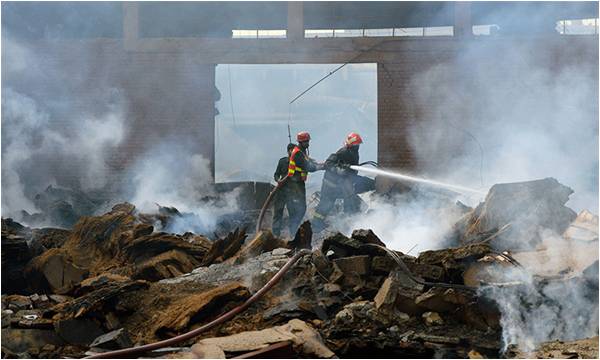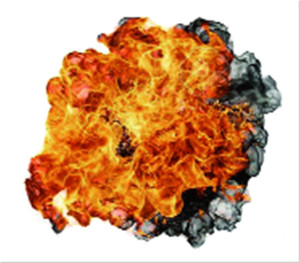
On November 20, Qamar Ahmed Tahir – the head of security at a chipboard factory in Jhelum – was arrested over allegations of burning the Quran. Qamar, like the owner of the factory, is an Ahmadi by faith. The news of the arrest spread, resulting in an enraged mob torching the factory late at night, with workers – many of whom were Ahmadis – inside.
“Everyone was going about their usual routine in the evening, when two workers spread the rumour about the alleged burning of Quran’s pages,” said an Ahmadi worker in the factory who has left the town along with his family following the incident.
“The security head was arrested by the police, and announcements were made in mosques: ‘Qadianis (a derogatory term for Ahmadis) have burnt the Quran and it is time to renew your faith’,” he said. “The mob broke into the factory and torched everything it could find, including our residences within the factory premises. The fire has destroyed almost 70% of the factory and eight vehicles parked inside were also severely damaged. The owner’s residence, adjacent to the factory, was also destroyed.”
Adnan Malik, a senior police official in the area, confirmed that the incident took place after Tahir’s arrest. “We registered a blasphemy case against Qamar and arrested him after confiscating the burnt material, which also included copies of the Holy Quran,” he claimed.
Eyewitnesses said that the police tried to stop the mob so it wouldn’t burn people alive.
“The police intervened and countered the mob, which eventually dispersed,” said a witness. “Some people from the mob were arrested, others ran away. But the police couldn’t stop them from torching the factory building and the residences.”
According to reports, the dispersed mob went to the Grand Trunk Road and blocked the route, while chanting slogans against the police. A clash between the mob and the police followed, with the latter firing rubber bullets and tear gas. The unrest went on till after midnight.
The very next day, an Ahmadi place of worship was attacked by a mob in Jhelum’s Kala Gujran area.
“The incident took place in the presence of law enforcement agencies,” says Amir Mehmood, who is in charge of the press section of Jamaat-e-Ahmadiyya Pakistan. “The (place of worship) was broken into, prayer mats and furniture were thrown out, and the mob burned Ahmadi literature,” he added.
Then, they washed the place of worship and prayed there, he said. “They tried to burn Ahmadi houses nearby after looting them. Thankfully no lives were lost.”
The spokesman of the Ahmadiyya community, Saleemuddin, says this was an effort to take over the place of worship. “The mob raised their flags there as well, trying to signify a conquest,” he claims. The police have since sealed the building.
Saleemuddin says the attacks on the factory and the place of worship signify barefaced targeting of the Ahmadiyya community.

“The factory arson was a planned attempt to burn Ahmadis alive,” he says. “Someone made the vicious allegation of blasphemy for personal vendetta and animosity.”
The Ahmadiyya spokesman says that the community holds the Quran in highest esteem and no Ahmadi would attempt to defile the book.
Since the two attacks, members of the Ahmadiyya community have fled Jhelum fearing for their lives. Saleemuddin couldn’t find any Ahmadi during his trip to the city on Monday. “Every single Ahmadi has left the town. I tried to find someone to meet. But there was no one there. People have locked their homes and left the town. Some of them even left their doors unlocked and fled to save their lives. The houses were looted and torched either way.”
An Ahmadi resident of Jhelum, asking not to be named, said that he’s not returning to the city any time soon.
“The mullahs carried out rallies all over the city, and even nearby towns and villages,” he said. “They chanted slogans calling the entire Ahmadiyya community is wajibul qatal (liable to murder). Even the police couldn’t stop them. We’re not going back any time soon.”
Saleemuddin has questions about the implementation of the National Action Plan. “The ban on hate speech seems little more than paperwork, with the extremists free to spread their hateful anti-Ahmadiyya propaganda.”
“Everyone was going about their usual routine in the evening, when two workers spread the rumour about the alleged burning of Quran’s pages,” said an Ahmadi worker in the factory who has left the town along with his family following the incident.
“The security head was arrested by the police, and announcements were made in mosques: ‘Qadianis (a derogatory term for Ahmadis) have burnt the Quran and it is time to renew your faith’,” he said. “The mob broke into the factory and torched everything it could find, including our residences within the factory premises. The fire has destroyed almost 70% of the factory and eight vehicles parked inside were also severely damaged. The owner’s residence, adjacent to the factory, was also destroyed.”
Adnan Malik, a senior police official in the area, confirmed that the incident took place after Tahir’s arrest. “We registered a blasphemy case against Qamar and arrested him after confiscating the burnt material, which also included copies of the Holy Quran,” he claimed.
"Every single Ahmadi has left the town"
Eyewitnesses said that the police tried to stop the mob so it wouldn’t burn people alive.
“The police intervened and countered the mob, which eventually dispersed,” said a witness. “Some people from the mob were arrested, others ran away. But the police couldn’t stop them from torching the factory building and the residences.”
According to reports, the dispersed mob went to the Grand Trunk Road and blocked the route, while chanting slogans against the police. A clash between the mob and the police followed, with the latter firing rubber bullets and tear gas. The unrest went on till after midnight.
The very next day, an Ahmadi place of worship was attacked by a mob in Jhelum’s Kala Gujran area.
“The incident took place in the presence of law enforcement agencies,” says Amir Mehmood, who is in charge of the press section of Jamaat-e-Ahmadiyya Pakistan. “The (place of worship) was broken into, prayer mats and furniture were thrown out, and the mob burned Ahmadi literature,” he added.
Then, they washed the place of worship and prayed there, he said. “They tried to burn Ahmadi houses nearby after looting them. Thankfully no lives were lost.”
The spokesman of the Ahmadiyya community, Saleemuddin, says this was an effort to take over the place of worship. “The mob raised their flags there as well, trying to signify a conquest,” he claims. The police have since sealed the building.
Saleemuddin says the attacks on the factory and the place of worship signify barefaced targeting of the Ahmadiyya community.

“The factory arson was a planned attempt to burn Ahmadis alive,” he says. “Someone made the vicious allegation of blasphemy for personal vendetta and animosity.”
The Ahmadiyya spokesman says that the community holds the Quran in highest esteem and no Ahmadi would attempt to defile the book.
Since the two attacks, members of the Ahmadiyya community have fled Jhelum fearing for their lives. Saleemuddin couldn’t find any Ahmadi during his trip to the city on Monday. “Every single Ahmadi has left the town. I tried to find someone to meet. But there was no one there. People have locked their homes and left the town. Some of them even left their doors unlocked and fled to save their lives. The houses were looted and torched either way.”
An Ahmadi resident of Jhelum, asking not to be named, said that he’s not returning to the city any time soon.
“The mullahs carried out rallies all over the city, and even nearby towns and villages,” he said. “They chanted slogans calling the entire Ahmadiyya community is wajibul qatal (liable to murder). Even the police couldn’t stop them. We’re not going back any time soon.”
Saleemuddin has questions about the implementation of the National Action Plan. “The ban on hate speech seems little more than paperwork, with the extremists free to spread their hateful anti-Ahmadiyya propaganda.”

